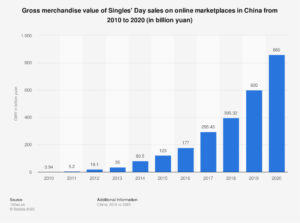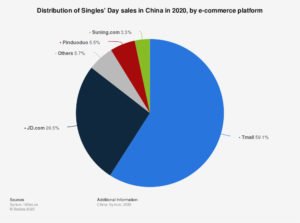Locaria Views: Major platforms and shopping festivals of 2C E-commerce in China
Many brands aspire to trade in China, the world’s second-largest e-tailing market after the U.S. in recent years. In 2020, online commerce transactions in China reached approximately 11.76 trillion yuan, representing a 10.6 percent year-on-year growth. The largest B2C e-commerce retailer in China with regard to gross merchandise volume (GMV) was Tmall. Operated by Alibaba Group, Tmall had generated a transaction volume of about 3.2 trillion yuan in 2020. The GMV of the leading C2C online retail platform taobao.com, also operated by the Alibaba group, had reached almost 3.4 trillion yuan the same year. The retail GMV transactions on Alibaba’s e-commerce marketplaces in China reached approximately 7.49 trillion yuan in FY2021 with a year-over-year growth of 21%. For the March quarter of 2021, Tmall online physical goods GMV grew 26% year-over-year and Taobao online physical goods GMV grew even faster as SME merchants recovered from the pandemic
Major ecommerce platforms in China#
Alibaba: the e-commerce giant#
Established in 1999, Alibaba.com was founded by Jack Ma, who stepped down as chairman in September 2019. Initially, Alibaba was a traditional e-commerce company but has now transformed into a conglomerate. It has a wide range of businesses including services such as financial, logistics, digital media, and cloud computing. The company hosts the largest B2B (Alibaba.com), C2C (Taobao), and B2C (Tmall) marketplaces in the world. It has been expanding into the media industry.
In the fiscal year ended 31 March 2021, the revenue of Alibaba amounted to 717,289 million yuan (US$109,480 million), an increase of 41% year-over-year. The number of annual active consumers across Alibaba’s China retail marketplaces was 811 million, an increase of 85 million from the twelve months ending March 31, 2020.
JD.com#
JD.com, also known as Jingdong, is a Chinese e-commerce company headquartered in Beijing, founded by Liu Qiangdong in 2004. The company began as a sales agent for CD-ROMs and grew to an e-commerce giant which raised $1.78 billion when it went public in the U.S. Nasdaq market in 2014. It is the second massive B2C online retailer in China by transaction volume and revenue, a member of the Fortune Global 500 and a major competitor to Alibaba-run Tmall.
JD.com features electronics, home appliances and general merchandise products such as books through its main online portal. These items sold through its main retail site are acquired from manufacturers and distributors and then offered at competitive consumer prices on the platform. In 2020, the total net revenues of the online shopping company JD.com amounted to 745.8 billion yuan.
Pindoudou#
Founded in 2015, Pinduoduo took two years and ten months to hit Nasdaq, becoming one of the fastest IPOs among Chinese internet firms. The success of Pinduoduo has relied on its unique business model, a combination of group buying and social shopping. The platform encourages its users to join team buying to secure a better price and share links for various items with their friends in exchange for coupons. This scheme effectively lowers Pinduoduo’s customer acquisition cost.
Another key element to Pinduoduo’s miracle growth was its strategy to target the rural market. While most Tmall users were from bigger cities, the e-commerce market has been nearly saturated in China’s first and second-tier cities. Pinduoduo managed to win a large market share in lower-tier cities and counties. As of 2020, China’s online population in third-tier or smaller cities reached nearly 700 million. The lower-tier cities became a new driver of the economy. Small towns and cities showed their potential as a fast-growing and alluring market for those online retailers. The majority of Pinduoduo’s users were from the third-tier cities or below, and these users were more sensitive about price.
In 2020, the annual revenue of Pinduoduo Inc. amounted to 59.49 billion yuan.
Major ecommerce shopping festivals in China#
A core Locaria value is “Celebrating Language with Data” to ensure that the linguistic solutions we provide are supported by deep in-market understanding of the end customers. In China, in particular, it is critical to understand the culture and behaviours surrounding shopping and search habits, for brands to fully succeed.
Singles’ Day Sale (11th Nov)#
Alibaba Group launched the Singles’ Day marketing plan in 2008, focusing on offering numerous discounts, red packet coupons, and promotions to improve sales on November 11 (also called double 11). The holiday lands on November 11 every year, as 1 represents single. This date was chosen to represent single people among Chinese youth from the early 1990s.
In 2020, China’s Singles’ Day sales online transaction value reached 860 billion yuan, surging from 0.94 billion yuan in 2010.

Reference: https://www.statista.com/statistics/1176984/china-singles-day-sales-gmv/
The leading Chinese B2C e-commerce platform Tmall accounted for almost 60 percent of the total GMV during the Singles’ Day sales in 2020. In the meantime, the sales share of the social commerce platform Pinduoduo accounted for about 5.5 percent.

618 Shopping Festival (Mid-year Sale)#
The 618 shopping festival, launched by JD in China in 2004, is the second largest online sales event next to Single’s Day sales in China. Lasting almost a month this year from the end of May to June 20, the month-long sales event is widely adopted by China’s e-commerce giants like Alibaba’s Taobao/Tmall, Pinduoduo, JD.com and retailers.
During the festival, major e-commerce platforms accelerated efforts to offer steep discounts, shopping coupons and the use of livestreaming product promotions to shore up an economy hard hit by the novel coronavirus pandemic.
In 2021, the 18-days 618 shopping festival had a growth of 26.5% in GMV across the entire network, reaching a total of 578.48 billion yuan. The Top 3 platforms are still Tmall, JD, and Pinduoduo.
Other sales throughout the year#
Apart from Singles’ day and Mid-year sale, there are also other events going on throughout the year. Almost once a month, these seasonal “mini” sales keep the customers entertained while serving as boosters on numbers. These sales could be general on all categories or themed on electronics, apparel, cosmetics, home appliances, maternal and infant products, etc. It also follows the calendar on public holidays or special festivals. For example, there will be promotion events before Chinese Lunar New Year (normally on Jan/Feb), for Valentine’s Day (Feb), Spring sale/pre-summer sale during the Labour Day holidays and National Day Golden week holidays. There are also some events generated because of common social conventions. For instance, the “Home Decoration Sale” starts normally in April as it was a popular season for refurbishment. Also “Back to School Sale”, starting in late August, covers almost all essentials that a student needs – electronics, stationery, books, clothing, etc.
There are some shopping events that go after the “lucky numbers”, for example, for 8th August (double 8), 9th September (double 9) and also 12th December, which is an “encore” for the Singles’ day Sale.
Almost all 2C e-commerce platforms are making an effort to create or spread out the promotions over a year and to make sure there are some “bargains” happening every month. The promotion methods are evolving, going from straightforward discounts and reductions to the use of more tactful methods, such as pre-sales and pre-orders, red envelope bonus, price-break discounts, gift-with-purchase etc. There are also more varieties on the ways to attract more customers, for example live streaming promotion shows, advertising through short videos or posts on social media, celebrity marketing etc.
In recent times, China has now gradually recovered from the COVID crisis. Its consumers seem to feel more secure and more enthusiastic about unleashing their massive buying power. There are indeed great opportunities in this non-stopping circle of sales throughout the year with dazzling promotion tricks and evolving channels.
To find out more about Locaria and the services we can offer your business why not get in touch. Whilst you’re here, you can also take a look at a few of our latest blog posts here.

Article by Rene Hsu – China Language Lead – Locaria



